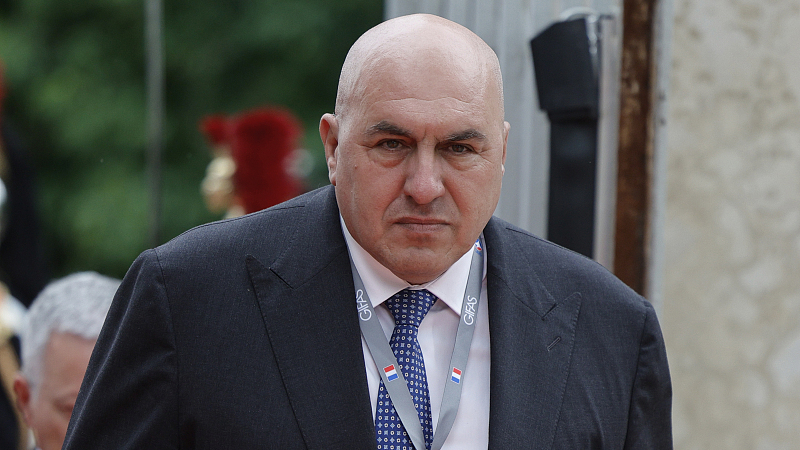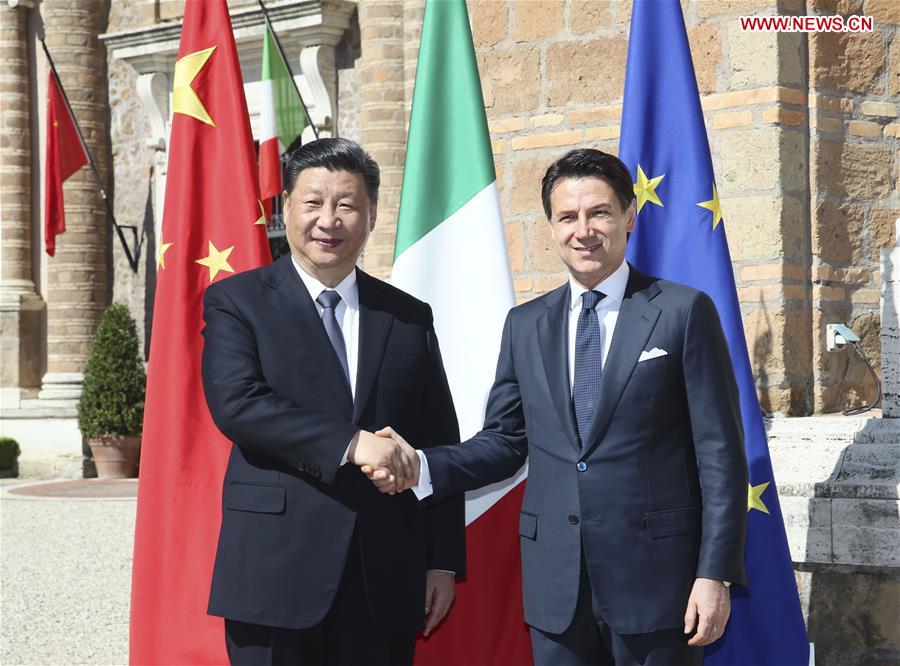
Italian Defense Minister Guido Crosetto arrives at the European Air Defense Conference at Les Invalides monument in Paris, France, June 19, 2023. /CFP
Italian Defense Minister Guido Crosetto arrives at the European Air Defense Conference at Les Invalides monument in Paris, France, June 19, 2023. /CFP
Editor's note: Federico Giuliani, a special commentator on current affairs for CGTN, is an Italian journalist who writes about Asian affairs. The article reflects the author's opinions and not necessarily the views of CGTN.
Italian Defense Minister Guido Crosetto recently called Italy's choice in 2019 to join the China-proposed Belt and Road Initiative (BRI) an "improvised and atrocious" decision. He also said that this step forward by Rome would contribute little or nothing to increasing Italian exports to Beijing.
The Italian minister reported two statements that were far from reality and refutable with concrete examples. First of all, in 2022 the trade volume between Italy and China reached $77.884 billion, an increase of 5.4 percent year-on-year. Indeed, in the first five months of this year, Italian exports to China increased by 58 percent year-on-year. This allows us to emphasize from the outset that the economies of the two countries are highly complementary and that bilateral economic and trade cooperation continues to be strong, despite the years of the COVID-19 pandemic and growing international geopolitical tensions.
Thus, the BRI was part of an inherently favorable context, offering the Italian government the chance to strengthen its relations with China and multiply mutual opportunities — in the economic field, certainly, but also in the scientific, cultural and numerous other areas. After all, the agreements signed should serve Italy as a foundation on which to build win-win relations.
Crosetto's words reveal a serious, basic misunderstanding of what the BRI is and what it is for. An initiative can be misconstrued in multiple dimensions, from the economic to the cultural, which is too often infused with geopolitical intentions of feeding anti-Chinese sentiment.
Italy is certainly not the only nation to have legitimately chosen to join the initiative. It is the first and only country in the G7, but not the only one in the G20, and more importantly, it is only one of more than 150 states that are participating in the initiative proposed by China.
Four years ago, then-Italian Premier Giuseppe Conte inaugurated in Rome Italy's adventure in the BRI with Chinese President Xi Jinping. But his government consisted of two parties: Movimento 5 Stelle, Conte's party, but also Lega, whose many politicians criticize the BRI today. Not only that, the entire process to the agreement of Italy with China was also accompanied, step by step, by the President of the Italian Republic, Sergio Mattarella. Impossible, then, to speak of an "improvised and atrocious" act, as if the signing of the Memorandum of Understanding with China was the result of a handful of beginners in the dark.

Chinese President Xi Jinping and Italian Prime Minister Giuseppe Conte hold talks in Rome, Italy, March 23, 2019. /Xinhua
Chinese President Xi Jinping and Italian Prime Minister Giuseppe Conte hold talks in Rome, Italy, March 23, 2019. /Xinhua
It is also necessary to refute the economic aspect of Crosetto's words, according to which the BRI has brought little benefit to Italy. Well, for more than four years, from 2019 to 2022, the volume of bilateral trade between China and Italy has repeatedly reached new highs, increasing by 42 percent.
Net of the various contradictions listed, it is worth analyzing the adequacy and quality of Crosetto's claims. He is the Italian defense minister, who deals with national defense and not economic affairs; so it is not clear why Crosetto analyzed a topic outside of his institutional role. It should be remembered that the BRI is a purely economic cooperation initiative, which has nothing to do with a country's defense. Consequently, the task of weighing its results, and providing official assessments and suggestions on it should be assigned to ministers in charge of the economy, to avoid incurring gross oversights.
China provides facilities of various kinds for the export of high-quality Italian products, prioritizes and supports Italy's high-level participation in China's major international trade fair events, and encourages cooperation between the two countries' trade-promoting events. Moreover, Italy is a country that imports from China raw materials, components, semi-finished products and, in the last 15 years, also finished products and technology (for example, solar panels). We can say that the Italian economy is necessary to China, as the Chinese economy is necessary to Italy, in a perfect form of complementarity.
As if that were not enough, to claim, as Crosetto did again, that China is both a competitor and a partner is an offense against logic. Almost a fig leaf to avoid admitting a willingness to consider China as an adversary that, nevertheless, cannot be dispensed with for commercial reasons. But which country in the world would ever agree to partner with a government that considers it some sort of enemy?
Leaving the rhetorical question unanswered, it is worth noting the timing of Crosetto's statements: in the aftermath of the meeting between Italian Prime Minister Giorgia Meloni and U.S. President Joe Biden. Many analysts speculated that Meloni might withdraw from the BRI in Washington, but instead, nothing of the sort happened. On the contrary, the Italian leader explained that Rome has yet to decide what to do about the initiative. Did Crosetto intervene with this suspicious timing to put pressure on Meloni herself? Instead of piling up diplomatic blunders over and over again, members of the Italian government could (and should) work together so that Italy can use its unique position to serve as a trait d'union between East and West and make the best use of the BRI to contribute to global development.
(If you want to contribute and have specific expertise, please contact us at opinions@cgtn.com. Follow @thouse_opinions on Twitter to discover the latest commentaries in the CGTN Opinion Section.)